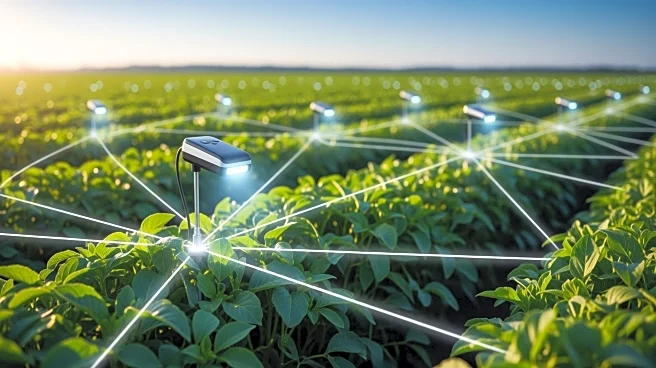What's Happening?
Verdia Diagnostics, a startup from North Carolina State University, is pioneering a new technology that uses plant sensors to detect crop diseases before visible symptoms appear. Led by CEO Zach Hetzler, the company has developed flexible sensors that attach
to plant leaves, monitoring volatile organic compounds emitted by plants under stress. This innovation allows farmers to receive real-time insights into crop health, potentially reducing yield losses caused by pests and pathogens. The technology, which has shown promising results in controlled trials, is set to undergo greenhouse-scale pilot studies, with commercial pilots planned for next year.
Why It's Important?
The development of Verdia's plant sensors is significant for the agricultural industry, as it addresses the persistent challenge of crop losses, which account for nearly 40% of global food production. By providing early detection of diseases, this technology could enhance food security and sustainability, particularly in controlled environment agriculture such as greenhouses and vertical farms. The ability to prevent disease outbreaks before they become visible can lead to improved productivity and reduced losses, offering economic value to farmers who operate on tight margins. This innovation could transform disease management practices in agriculture, contributing to more resilient food systems.
What's Next?
Verdia Diagnostics plans to launch its first commercial pilots early next year, focusing initially on controlled environment agriculture. The company aims to validate and scale its technology for broader applications in open-field agriculture. CEO Zach Hetzler will present the technology at the FAO Science and Innovation Forum in Rome, showcasing its potential to strengthen global food security. As the company continues to refine its business strategy and connect with industry mentors and investors, it seeks to bridge the gap between cutting-edge plant science and practical farm solutions.
Beyond the Headlines
Verdia's approach to plant diagnostics represents a shift towards integrating advanced technology with traditional farming practices. By empowering growers with plant-level intelligence, the company is contributing to the reduction of global food waste and the enhancement of sustainable agricultural systems. This innovation not only supports resilient agricultural practices but also aligns with broader efforts to address climate change and environmental sustainability in farming.















